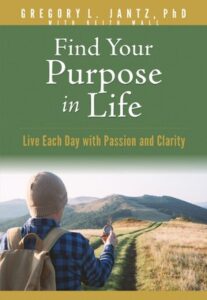Preview:
Dr. Gregory Jantz: You know, one of the things that’ll stop purpose and mission is unforgiveness in our life. Make sure that you have, um, practiced forgiveness in your relationships. You will become more grateful. You will become more optimistic. And remember, I know I’ve said it before, but hope comes when we have a plan. There can be a plan for your purpose.
End of Preview
John Fuller: That’s Dr. Gregory Jantz describing how God calls you to His unique purposes in life. And we’ll be discussing the power, and the pathways, and practical aspects to discovering your purpose today. Thanks for joining us for Focus on the Family with Jim Daly. I’m John Fuller.
Jim Daly: John, I can remember being a sophomore in college my second year, and I just hit a wall. I was like, “What am I going to do with my life?” And it felt aimless, and i- it felt like I didn’t know what purpose I had.
John: I think a lot of us had those moments.
Jim: Yeah. It probably, you know, it’s pretty common from 18-24 to probably feel that, and even beyond. But we want to address that because we don’t want you to sit in that place and not understand what God’s purpose is for you. And, boy, I remember in my 20s trying to figure that out. “Lord, what is that purpose?” And I’ve come up with some ideas that we’ll share today, along with our guest about how to identify that special purpose, that God calling in your life. What does it mean? What can I do vocationally? How do I turn that toward the Lord, finding a spouse, building a family, all those kinds of wonderful things that are in store for many young people?
John: Mm-hmm. Yeah, and He’s promised in His Word that He’s created good works for us to be doing on His behalf in this world. Uh, our guest is going to help us discover some of the ways that we can rise up to those purposes. Dr. Gregory Jantz has been here a number of times, and he’s the founder of The Center: A Place of Hope that’s in Edmonds, Washington, and it’s a renowned treatment center for depression. He’s also the author of more than 40 books, and one of those is a very small, very practical book. It’s called Find Your Purpose in Life: Live Each Day with Passion and Clarity. And we’ve got copies of that book here at the ministry. Give us a call, 800, the letter A and the word FAMILY, or stop by focusonthefamily.com/broadcast for all the details.
Jim: Dr. Jantz, welcome back to Focus on the Family.
Gregory: Very good to be with you.
Jim: It’s always good to have you here. I just-
Gregory: Thank you.
Jim: … so appreciate the, uh, really, the experience the Lord has given you. You, you did a PhD in psychology, I would assume.
Gregory: Um-
Jim: (laughs)
Gregory: … and, and done a lot of counseling through the years.
Jim: A lot of counseling through the years, and so you bring all that to bear. Uh, Greg, you share some interesting statistics about how people crave purpose and meaning in their lives. Um, first, share those findings, and then … I mean, you heard that expression in the opening there about my sophomore year in college, going-
Gregory: Yes.
Jim: I remember crying, going to the counselor, “I don’t know what do I do with my life!”
Gregory: Yes.
Jim: You know? I mean, it was like a dark moment for me. I just didn’t know. I knew the Lord. I was a Christian. But I was like, “I either got to find exactly what he wants me to do …” It almost was crippling because I didn’t know what he wanted me to do.
Gregory: And sometimes, we get really wrapped up into … and we have to make a decision because one of the first questions people ask you is,” What do you want to be when you grow up?” Right?
Jim: Especially your sophomore year in college.
Gregory: Yes.
Jim: You better start figuring that out. And it was pressure.
Gregory: And there’s the, there was, there is the pressure. And the reason why I’ve written this small book is, uh, I get to see people work through trauma and some really tough things.
Jim: Yeah.
Gregory: But a question does come up. The question is, well, I’ve worked through a lot. Now what do I do?
Jim: Yeah. Speak to the crave component, craving purpose. That’s such-
Gregory: Okay.
Jim: That’s very specific language.
Gregory: Well, we know that we have three basic human needs. Number one is we have a need to be accepted, which means loved. I need to feel loved. We all need that. Um, the next one is to be affirmed. I need to know I have value. And the other is to be understood. I need people to understand me. So, to be affirmed, to have value means I must have a purpose. Now, I believe that God has created us with a indispensable purpose. You do have a purpose. It doesn’t mean you do any one singular thing in, in a career necessarily, but there’s a purpose for your life. I questioned mine. I went through a significant crash many years ago, but I went through it. And I questioned my calling. Did I choose the wrong career? What am I supposed to do with my life? And it wasn’t until I worked through all of that … I came out on the other end a lot more passionate about the calling that I feel God gave me.
Jim: What was that timeline?
Gregory: So, the timeline … well, for me, that, my crash was in 1989.
Jim: Yeah. But I mean, how many years or months did it take to, for you to get through the fog and go, “Okay, I got it?”
Gregory: Well, I think it took me a year just to figure out, “Okay-”
Jim: Yeah.
Gregory: “I need to take care of myself. I need to slow down and make some good decisions.”
Jim: Yeah. That can be a dark place for all of us-
Gregory: Yes.
Jim: … whether you’re a believer in Christ or not, where you just feel like you’re floundering. You, d- I, I, I mean, why, why did I get a business degree? I don’t know that God wants me to do business.
Gregory: Right.
Jim: Why did I get a psychology degree? Why did I not go to college?
Gregory: Yeah.
Jim: I mean, all this is … ah.
Gregory: And then, if we’re a parent, we worry about it for our kids.
Jim: Oh, yeah.
Gregory: Um, so I know we have parents, or you’ve had … you have a teenager, and you’re, you’re like, “Will they ever find their special purpose?”
Jim: Yeah.
Gregory: You’re worried about it.
Jim: Yeah, yeah.
Gregory: So-
Jim: That’s pillow talk with parents.
Gregory: Yes.
Jim: Do you know what so-and-so said today? Your son, your daughter … (laughs)
Gregory: Right.
Jim: Why is it always your son and your daughter-
John: I don’t know why that is.
Jim: … and not the spouse’s son or daughter? You know? L- you met a woman, Darla, who came to the center battling with severe depression. That’s something the center-
Gregory: Yes, yes.
Jim: That is your expertise. But what was Darla’s story, and how did you see her reignite her purpose in life?
Gregory: So, uh, Darla was a individual who, through all the despair and everything she worked through, um, she felt like she had missed her calling. She felt like there was no way that, um, any good can come from any of this. But what happens is as I work through the pain, I work through the pain, God begins to open up, uh, that there is a purpose for my pain. So, a lot of times, if you’ve had a lot of pain in your life, you feel like it’s robbed you. But God’s going to turn that pain around, and there’s going to be purpose in that pain. Now, I want, I want you to know that I believe God said what? We are His workmanship created to do good works that He prepared for us in advance, so there is a plan for you.
Jim: Mm.
Gregory: You may have had some derailments along the way, but there is still a plan. And hope comes, uh, when I feel like there’s a plan, so l- uh, part of the hope is I’m going to go to God and ask, “Show me the plan.” But don’t do it obsessively. It’s like, um, sometimes when you get so wrapped up into the worry … “What am I supposed to be doing?” That you don’t do anything.
Jim: Hmm.
Gregory: There is a purpose, and there’s a purpose for the pain. And there is a plan for your life. I can say that today really confidently because I worked through the pain. I’ve understood now more about the purpose, and I’m going to be faithful to that. Now, I also have kids, and I know that we worry about our kids. I know we’re worried about their futures, or we can worry.
Jim: Mm-hmm.
Gregory: But God has a plan for them.
Jim: Yeah. You know, sometimes it feels like such a fog you’re in, and you don’t feel like you’ll ever find the doorknob to get out of that room with all the fog. It feels overwhelming. And in that moment, what are some things that you could do to calm yourself, to kind of center yourself on the Lord, and on Scripture, and I may be answering the question there, but-
Gregory: But centering yourself on … that’s great advice-
Jim: Yeah.
Gregory: … Jim.
Jim: Yeah, but to get rid …to be fog-clearing, what are some of the things you should do?
Gregory: Well, uh, one of the things I, I want us to do is, there could be, uh, many things that you’re worried about that are clouding a sense of purpose.
Jim: Mm-hmm.
Gregory: And so, let’s start by giving the Lord our worries. It could be our worries for our life, our spouse. Um, there could be a lot of present-day struggles. There could be w- worry over finances. Um, there could be worry over our children and their futures. Some are really worried about well, the way the world’s going, there’s no hope for my kids.
Jim: Yeah.
Gregory: And we get fixated on the no hope.
Jim: Yeah.
Gregory: So, um, that’s okay. I want you to make a list of all of those worries.
Jim: Yeah.
Gregory: Write them down.
Jim: That’s a good idea.
Gregory: Um, but we’re not going to stay on the negative.
Jim: That’s good.
Gregory: Okay?
Jim: Yeah. (laughs)
Gregory: Yes. Um, and we’re going to have to start believing God’s Word is true. It’s true for me. It’s true for my kids. And we’re, uh, going to have to make a decision we do not give up.
Jim: Yes. Now, don’t ask me why I’m, uh, even going to share this. Jean and I, we love binging Air Disasters. (laughs) I don’t know why. It’s always-
John: So, you binge watch-
Jim: … pilot error and ice on the wing.
Gregory: Yes.
John: Plane crashes.
Jim: But the point of it is, you know, uh, it’s, it can feel like the yoke is stuck, and you’re in a dive.
Gregory: Yes.
Jim: And y- you know, all the buzzers are going off. All the sensors are going off. And of course, they recreate these things in that series, but you know-
Gregory: Right.
Jim: … you, you’ve got to take some decisive action in the cockpit to be able to level off and to regain control. Relate that all to emotionally what’s going on when you feel overwhelmed. You feel like I don’t have a purpose.
Gregory: Yes. You can feel despair.
Jim: Despair, disorientation.
Gregory: And despair leads to despondency. And when I feel despondent, then I don’t see hope for my future. So-
Jim: Hm.
Gregory: Sometimes, we even need to go back, even to our childhood, and go, “Hey, what were the things I really loved as a kid?”
Jim: Huh.
Gregory: “What were the things I did as a kid?” And it’s really interesting. God gave us all gifts and talents. They’re there whether you don’t see them or not. Sometimes, you need to go to another person who’s known you for a while. Ask them, “I’m doing a little survey. Can you tell me what do you see as my gifts and talents?”
Jim: (laughs)
John: (laughs)
Gregory: It’s a funny way to have a conversation.
Jim: Don’t do that with your knucklehead friends.
John: (laughs)
Jim: Because they’re not going to help you much.
Gregory: Be careful who you ask.
Jim: Yeah, the serious friends are who you want to ask.
Gregory: Yeah, yeah. So, but, um, begin to get feedback from others. What do you see in me?
Jim: Yeah, that’s good.
Gregory: It can be really reinforcing, but you have, uh … now, a talent is something that you’re good at, but it requires practice.
Jim: Mm-hmm.
Gregory: I thought, years ago, I might be good at playing the guitar, but I didn’t keep practicing. Okay?
Jim: (laughs) Neither did I.
Gregory: So, you know, just an example. So, that’s wouldn’t … that wouldn’t be on my talent list today. But, uh, a gift is something God gave you. You were born with it. We might see it in your personality. We might … there’s just that natural, innate gifts. When I find that I have purpose, I’m probably using my natural, innate, God-given gifts.
Jim: In fact, you mentioned ten ways that finding your purpose is beneficial. Describe some of those.
Gregory: Okay. You’re going to feel fulfilled. You’re going to feel like I have-
Jim: That right there’s big.
Gregory: Well, that’s a huge one.
Jim: Huge!
Gregory: But you’re going to feel like I have meaning. Like, I-
Jim: There’s another big one.
Gregory: I got up, and I made it to wherever work is, and it was meaningful, and it made it a little easier. Now, contrast that to a person who goes, “I’m miserable. I can’t even stand to go to work.” Okay? But we don’t see our calling just in work. We probably are seeing some of our talents in work. But it’s nice to be able to get up and go, “I have a purpose and meaning. I have a reason to get up.”
Jim: Yeah. No, it’s so good. You know, it’s interesting. One of the best compliments … people come to the campus, which, you know, everybody’s invited. I’d come in the summertime if I were you.
John: Mm-hmm.
Jim: We get a couple of hundred thousand visitors a year. And, uh, but somebody left a note one time, and this was so good. They said, “Your facilities crew is really stellar. I went into the restroom at the guest center at-
Gregory: Yes, yes.
Jim: … Focus on the Family. It was so clean and so well taken care of. That’s all I needed to know about how Focus on the Family is run.”
Gregory: Wow.
Jim: And I thought to myself … and we talked about-
Gregory: Yes.
Jim: … that often because the facility team-
Gregory: Yes.
Jim: … I mean, they’re not out there meeting with the donors. They’re not meeting with the people impacted like we get to do.
Gregory: Right.
Jim: But they knew their … they knew if they did a good job, it would be noticed.
Gregory: Mm-hmm, mm-hmm.
Jim: Or, or even that their call is to do a good job whether it’s noticed or not. But this person came to the campus and noticed.
Gregory: Yes.
Jim: And it meant something to them.
John: Mm.
Gregory: So, and the facilities was doing this work unto the Lord.
Jim: Unto the Lord.
Gregory: Yes.
Jim: That’s like Notre Dame that had that fire not long ago.
Gregory: Mm-hmm.
Jim: But you know, now they can look into the beams and the timbers.
Gregory: Mm-hmm.
Jim: And behind the facades, they see where the artisans carved, uh-
Gregory: Oh, wow.
Jim: … different things in there. And even though it was behind the scenes, they said God’s eye can see it.
John: Hmm.
Gregory: Wow.
Jim: What a beautiful way to think of-
Gregory: Yes.
Jim: … the work we do. No matter mundane, but God’s eye is on you, and He sees and honors that person that works unto the Lord.
Gregory: Absolutely.
Jim: And that’s beautiful.
Gregory: And unto the Lord leads to other opportunity.
Jim: Mm-hmm.
Gregory: Yeah, there’s a blessing in that. So, when I am doing my calling, I do feel a sense of blessing. And with that is gratitude. Gratitude is powerful.
Jim: For no matter-
Gregory: Yes.
Jim: … what you’re doing.
Gregory: No matter what you’re doing.
Jim: Yeah, I like that. People tend to focus on a career when figuring out their purpose. You know, I’m going to be an architect. I’m going to be whatever. Uh, but you share that there are many other pathways you can take. Describe some of those.
Gregory: Well, I think one of the things, um, our ability to develop good and healthy relationships.
Jim: Yeah, that’s-
Gregory: We probably didn’t-
Jim: … first and foremost.
Gregory: In school, we probably did not have a class on that. (laughs)
Jim: Right. I guess that was called the, uh, the playground.
Gregory: (laughs) Yeah, the playground. Yeah, which is more real-life. You were dealing with bullies and so forth.
John: Mm-hmm.
Gregory: Um, but many times, as you think about it, really, what do I have? I have the quality of my relationships.
Jim: Mm-hmm.
Gregory: That’s what I have. And most everything comes through our relationships. And so God’s going to bless you through relationships. And I don’t mean manipulating relationships. I mean being in relationship because, um, that also will lead to opportunities that you may have never imagined.
Jim: Yeah.
John: This is Focus on the Family with Jim Daly, and our guest today is Dr. Gregory Jantz. And, uh, we’re covering, uh, some of the content in his excellent book called Find Your Purpose in Life: Live Each Day with Passion and Clarity. And we’ll encourage you to get a copy from us here. We’ve got the details at focusonthefamily.com/broadcast.
Jim: You know, so often, we’re, in raising our teenagers-
Gregory: Yeah.
Jim: … it’s one of the strongest things we could do as Christian parents is to help them understand their identity.
Gregory: Right.
Jim: And I can’t stress enough the importance of making sure they know God cares for them. He loves them. He has a purpose for them, and that their identity is in Christ as a, a new believer, a young believer. Speak to that need to build that up as a parent especially. And wh- what does that look like when you’re having that conversation with a 15, 16-year-old?
Gregory: Well, one of the things we have got to stay in relationship with them. We can get so frustrated. And wh- and sometimes, we have to hold, hold back some things because we’re so frustrated.
Jim: (laughs) Yeah.
Gregory: I want you to turn and go, “God has a purpose and plan for my son,” if that’s what it is. And I want you to remember the things you really appreciate. You know, to be able to verbalize to them, “You have always been so good at, um, caring-”
Jim: “X.” Yeah, whatever.
Gregory: Whatever it is. So, but keep speaking a blessing over them.
Jim: Yeah. B- and because that … the reason I’m stressing this is when that young person can develop a strong identity in Christ-
Gregory: Yes.
Jim: … well, it keeps them uh, you know, away from at-risk behavior in a greater degree to-
Gregory: Absolutely.
Jim: … to a greater degree.
Gregory: Yes.
Jim: Because I know what I’m here for. I know what I’m about that way. I don’t have to have it all figured out, but-
Gregory: Yes.
Jim: Yeah.
Gregory: And remind them, “God has great plans for you.” Bless them.
Jim: That’s just great to speak over your children.
Gregory: Oh, absolutely.
Jim: Yeah.
Gregory: You make … by the way, you may not see it yet. You, you may go, “I hope it’s true.”
Jim: (laughs) Yeah, right.
Gregory: Okay?
Jim: But to speak it over them, yeah.
Gregory: I want you to speak it over them.
Jim: Yeah, for sure.
Gregory: Yes. Uh, whatever you do, stay in relationship with them.
Jim: Yeah.
Gregory: God does have a plan and purpose for even the most challenging teenager.
Jim: Yeah. Boy, I so agree with that. I wrote about that in Good Dad. You know, that was my theme, and some people take exception with that. Sometimes, you have to straighten them out. I wouldn’t straighten them out at the expense of your relationship. That may sound controversial. You know, there’s good, bad-
Gregory: Don’t lose the relationship.
Jim: Don’t lose the relationship because that’s what the Lord-
Gregory: Yes, yeah.
Jim: … will use to build into their lives-
Gregory: Yeah, yeah.
Jim: … is your love as a dad or a mom and so on. Describe the importance of living with optimism and how it relates to purpose. I like this. I tend to be a glass-is-half-full kind of guy.
Gregory: Yes. Okay. But optimism starts with gratitude.
Jim: That’s good.
Gregory: Okay, gratitude you maintain even in the most dire circumstances. I thank you, God, that, um, that you are active in my life. And it could be, uh … our family in, uh, years ago, my wife went through a cancer diagnosis, and she taught me a great deal about gratitude. She had a routine that she has maintained today about writing gratitudes every day. I don’t know how many gratitude journals that she’s created over the years now, but it’s many. But the gratitude, it’s a choice perspective that says God’s in control. So, the m- … and we know, and there’s interesting studies around gratitude. People who have meaning and purpose will tend to be very grateful people. The … you’re g- They radiate gratitude. Um, and we like to be around grateful people. Grateful people produce optimism, which means I have hope for my future-
Jim: Yeah.
Gregory: … because I know God’s in control.
Jim: That, that is so true no matter what the endeavor, leading a company, leading a country as president or prime minister. People gravitate toward people who have a vision. I think the Old Testament says if you have vision that people have hope.
Gregory: Yes.
Jim: Right?
Gregory: And you need to remember that pertains not just to somebody else. That pertains to you.
Jim: Mm-hmm-
Gregory: You may feel like … you know, one of the things that’ll stop purpose and mission is unforgiveness in your life. I know. We come back to forgiveness. Make sure that you have, um, practiced forgiveness in your relationships. Make sure you are clean in forgiveness. You will become more grateful. You will become more optimistic. And remember, I know I’ve said it before, but hope comes when I have a plan. There can be a plan for your purpose.
Jim: I like it.
Gregory: And, and, and, but become actively involved in it.
Jim: Yeah.
Gregory: And we have a little saying around, um, around our home and actually at the, uh, at the center, A Place of Hope, and it’s that we are going to make progress every day.
Jim: Yeah, that’s good.
Gregory: Progress every day. How are you making progress every day?
John: Mm.
Jim: Uh, Greg, how does discovering your strengths help you to determine what to do next in life? I think in your 20s, that’s the crippling factor because you don’t want to make a mistake. So, you’re going, “What … okay, what is this next step? I go to college.” That’s a good one. I mean, so many big decisions are occurring in your 20s and early 30s.
Gregory: Yes.
Jim: Who you’re going to marry, your career, things that are going to lock you in, or seemingly lock you in, and if you don’t feel comfortable with them, you get very, uh, skittish on that decision-making.
Gregory: Yes. And I’ll have to tell you, in a counseling sense, how many folks who have said, “You know, I became a nurse because that’s what my parents wanted.”
Jim: Right?
Gregory: Or I chose this career because that’s what they wanted.
Jim: Yeah.
Gregory: And we did it for somebody else. And then there’s the word regret. We regret. And so, as a parent, I think part of what we have to do is release our kids to God’s plan.
Jim: Mm-hmm.
Gregory: You have hopes and dreams for them. That’s great. But they do not need to be a carbon copy of you or to fulfill your vision for them. We need them to fulfill God’s vision that God has for them.
Jim: And that’s the secret. How do you help your young person-
Gregory: Yes.
Jim: … get that idea of what does God want them to do?
Gregory: Well, okay, first of all, I’m going to teach them to be in, in God’s Word, to live b- … and we can do that in different ways, but we want to keep imparting God’s Word in their life. And I want to reinforce it by giving them that blessing. Um, we used to sing a silly little song over our kids nearly every night when they were little.
Jim: Oh, what did it sound like? (laughs)
Gregory: Well, it sounded like, (sings) “May God bless you and keep you all through the night.” That was just one part of it.
Jim: (laughs) I love it.
Gregory: But, but it was ending the day with a blessing.
Jim: Yeah, that’s good.
Gregory: And they need to know, um, that everything comes through the relationship with the Lord. Everything that, um, they’re called to do i- i- it will be made clear. The world’s going to going to pull you in a lot of different ways.
Jim: Yeah.
Gregory: Oh, a lot of different ways.
Jim: Yeah. Greg, one, I think one of the crippling things can be when you’ve made a decision, and then you kind of aren’t sure that it was the right decision.
Gregory: Yes.
Jim: Uh, as a counselor, I mean, what do you say to the person that, in some ways, might even get crippled by that? You know? Who, who said, “Yeah, I got a business degree because my mom and dad thought that was a good degree for me to get.”
Gregory: Yes.
Jim: “Now, I don’t like it. I don’t want to be in this.” What do they do?
Gregory: Well, I’m going to say, “I wonder. Now that you have the degree, um, what would you really like to do? And I wonder how God is going to use all of that education to fulfill His purpose in you.”
Jim: Yeah.
Gregory: It’s not wasted.
Jim: You know, i- w- I’ve kind of l- leaned into the parent parenting the child. I mean, your book’s really that purpose for your life.
Gregory: Yes.
Jim: What about the 30, 40, 50-year-old, 60-year-old that may still not feel like I hit my purpose? What do they do? I’m talking about the parents now.
Gregory: Oh, sure.
Jim: (laughs) The older person who’s going, “Wow. I’m listening to Greg right now. I don’t know if I really found my purpose.”
Gregory: Okay. But we need to remember God probably has multipurposes.
Jim: Yeah.
Gregory: Yeah. And at different seasons in our life, we may be called to do different things.
Jim: Mm-hmm.
Gregory: So, there was a season in my life where I was looking to be, uh, mentored, and I had people in my life that were fulfilling that role. And now, I’m … it’s a different season where people are more coming to me to be mentored, and so it’s a role change.
Jim: Yeah.
Gregory: So, part of my purpose has changed.
Jim: Yeah, that’s fair. Uh, what are some practical ways you’ve asked God to guide you in your decision-making? You know, that tree if you go back to-
Gregory: Okay.
Jim: … 20, 30-something, bang, bang, bang.
Gregory: Yes. Okay. I need wisdom and discernment. And so, sometimes-
Jim: Same thing Solomon asked for is-
Gregory: Yes. I’m, I’m praying for wisdom. And it’s even in, in working with a, a client, you know? What do we need? We need wisdom for how to help, wisdom. For my gifts and talents, I need wisdom. How do I be positioned? And, and even pray, “Lord, bring the people into my life that, uh, I will be aware of that, um, will be an opportunity. Show me.” I think back at The Prayer of Jabez, and, and “Broaden my territory-
Jim: Mm-hmm.
Gregory: … and open up so that I will see what you want me to do.”
Jim: Yeah. In the end, and this is where we’ll wrap up, uh, today, in the end, for that 35, maybe 40-year-old, who, yeah, they kind of went in a direction out of necessity. It may not be what turns their spark on every day. What should they be looking at? Should I hunker down and just look for the morsels of God’s joy in this vocation that I’m now in, even though I don’t really like it every day? Or should they, uh, prepare for a different pursuit?
Gregory: I think I would pray for wisdom. Lord Jesus, show me what’s next.
Jim: Mm.
Gregory: Uh, we have a counselor on staff that was way up in the technology world.
Jim: Mm-hmm.
Gregory: Way up.
Jim: Executive?
Gregory: Yeah, uh, executive. And a point came where he knew that he was called to be a counselor, went back to school, became a counselor-
Jim: (laughs)
Gregory: … mid-career, midlife, and is one of the best counselors.
Jim: Wow.
Gregory: So, God can change directions. But all that experience that he had as an executive and, and, uh, he’s using today.
Jim: Yeah.
Gregory: So, I always … nothing’s wasted. Yeah.
Jim: Yeah, that’s so good. I like that. Greg, this has been so good. And I hope people, um, if they’re struggling, or if their children are struggling, or their parents are struggling-
Gregory: Yes.
Jim: … who, whosever listening, Find Your Purpose in Life: Live Each Day with Passion and Clarity. Uh, why wouldn’t you want this resource? (laughs) That’s, that’s the kind of thing everybody wants, whether you’re 15 or 55. Right? And I hope, uh, you’ve, uh, gotten a little bit of the insider edition here of what, uh, Dr. Jantz is talking about. If you can get in touch with us, and John will give you those details. If you’re in a place that feels dry-
Gregory: Yes.
Jim: … that it’s not what you wanted to do, let us help you first by offering you Dr. Jantz’s book. And if you can make a gift of any amount, we’ll send it to you. And if you can’t afford it, we’ll send it to you and trust others will cover the cost of that. But we want to help nudge you along to find that enthusiasm every day to be able to wake up and say, “Come Holy Spirit.” You get out of bed, and you go.
John: Hmm.
Jim: And that’s a nice place. I feel like I’ve hit there here in my role at Focus. I feel very good. I do tell people I skip into work. It’s fun. I feel, uh, kind of the breath of God as I move along my day.
Gregory: And there are challenges, but you know-
Jim: Absolutely.
Gregory: … God is with you.
Jim: Yeah. It, it allows you … when you have that kind of core foundation-
Gregory: Yes.
Jim: … it allows you to smile in the challenges.
Gregory: Yeah, absolutely.
Jim: And that’s a great place to be. So, get in touch with us. And if you need to talk to a counselor, we can help you with that as well.
John: Yeah, we’re here to help, and we’re a phone call away. 800, the letter A, and the word FAMILY. You can also donate a request for a counselor callback and get a copy of this great book, Find Your Purpose in Life: Live Each Day with Passion and Clarity. All the details are at focusonthefamily.com/broadcast. And next time, we’ll hear from Justin and Lindsey Holcomb, offering practical tips and insight on how to talk with your child about babies.
Preview:
Dr. Justin Holcomb: Because that’s the question when they’re saying, where do babies come from? They’re not trying to ask a technical question.
Jim: Right.
Justin: They’re kind of wondering about themselves.
Jim: Right.
Justin: Like, did God have me in mind?
End of Preview


















